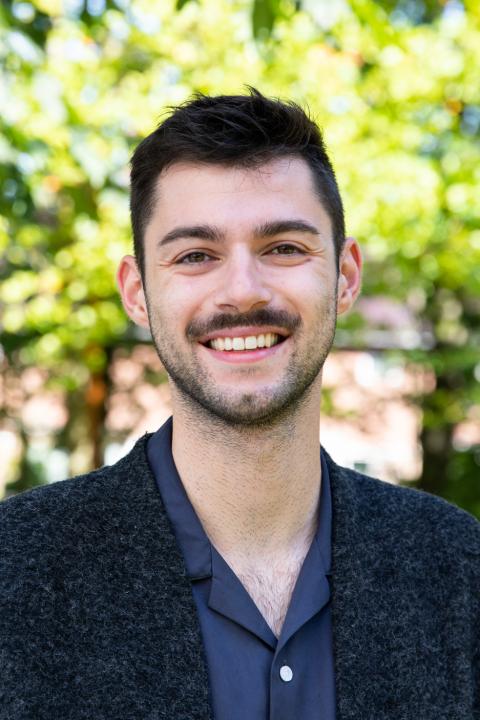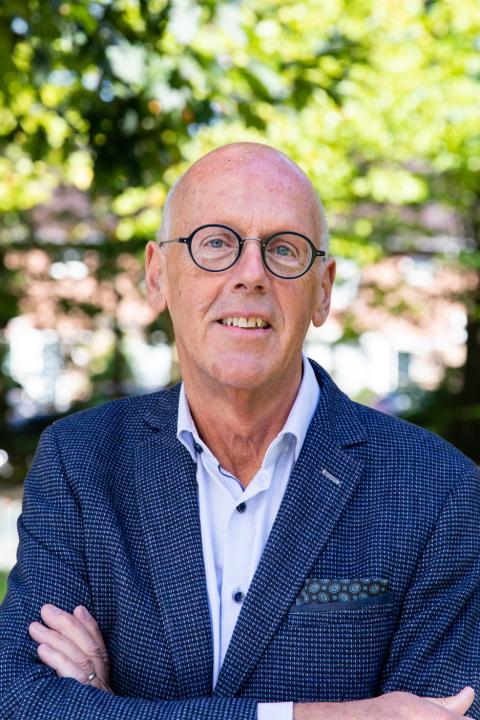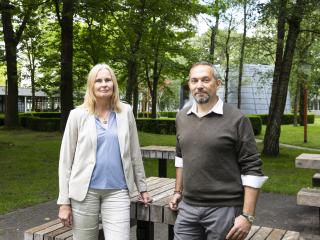Pursuing a PhD in the business sector opens doors that would remain closed otherwise
Conducting academic research in co-creation that can immediately be applied in HR practice. That is the rationale of doing a PhD in the business sector, an initiative of the People Management Center. In this expert center in the field of Human Resource Studies, researchers and the business community work on academic solutions for issues in HR practice. “This is a win-win situation,” PhD researcher Rubin Steegh states. “It’s great to see the direct impact of your research in the day-to-day practice.”
“Our business partners - usually large, international corporations – increasingly need knowledge on data-driven strategies in the field of HR and in the underlying theories of HRM and Work and Organizational Psychology. This lacuna in academic knowledge in the business sector is an important motivation for our approach,” say Professor Emeritus Jaap Paauwe and Associate Professor Karina van de Voorde of the People Management Center. “The researchers provide the expertise and can also strengthen the theoretical basis in this area with practical examples. This kind of partnership fits the spirit of the times in which recognition and rewards, impact and practical implications of research are becoming increasingly important.”
This kind of partnership fits the spirit of the times in which recognition and rewards, impact and practical implications of research are becoming increasingly important
Jaap Paauwe & Karina van de Voorde
Added value
Rubin Steegh is one of the PhD researchers in the program. His study on agility in organizations was developed in co-creation with Royal DSM, a Dutch multinational corporation active in the fields of health, nutrition and bio science, with approximately 30,000 staff worldwide. “What makes this project different is that, as a PhD researcher, you operate on the work floor for the first year or so. I was part of a strategic team and worked on starting up a People Analytics team and a policy document on the ethical use of personal data. My added value as a researcher soon emerged. With knowledge of statistics and theory in the field of Work and Organizational Psychology, for instance, allowed me to quickly anticipate the consequences of particular analyses.”

With knowledge of statistics and theory in the field of Work and Organizational Psychology, researchers have added value in HR practice
Rubin Steegh
Laura Stevens, PhD, is Global Lead Strategy, Analytics and Employee Experience, and also Rubin's manager at Royal DSM: “As a science-based company, it is vital for us at DSM to not just work according to this statement in our core business, but also in our functions. Rubin has added great and critical capabilities to our P&O function and contributed to the ability to attract similar talents!”
Flexibility
“Of course the partner organization is involved in the study, but the PhD researcher’s interests are central,” say Jaap Paauwe and Karina van de Voorde. “As supervisors, we are responsible for guaranteeing academic integrity and the quality of the research. That requires fostering the partner’s trust and commitment. We link up with a subject that is both relevant and directly applicable for the partner. This basically makes the study less fundamental and more practical. This also requires some flexibility from the PhD researcher: moving in time with the organization.”


Associate Professor Karina van de Voorde
Professor Emeritus Jaap Paauwe
Commitment
Rubin Steegh can relate to that: “The pace in the business sector is different from that in research. The dynamics can suddenly change with the circumstances. This makes it a tricky environment for academic research. A good relationship with and among all parties involved is crucial. You need to foster that right from the start. Apart from being a researcher, I am also a project manager and responsible myself for liaising with the supervisors from the university and the partner organization. For instance, I schedule periodic consultations with all stakeholders. During these consultations, we compare the situation at DSM with the academic knowledge available to find solutions to the challenges in HR practice. This type of discussions generate new academically relevant research. The professionals’ commitment often moves the research further. My supervisor at DSM, for instance, deployed her own network so I could ask my research questions in other organizations as well. That was extremely useful for my study and its reach, as well as my future career. This way of doing a PhD opens doors that would otherwise remain closed.”
The partner organization’s commitment and network is incredibly valuable to take the research further
Two languages
“My research is relevant for the academic literature and offers solutions to existing issues within DSM in the field of inclusion, agility, and people analytics. I’m learning two languages, as it were: that of the business sector and the academic one. This does not appeal to everybody. In the Master’s of Human Resource Studies, I gained knowledge of theory and research methods. In addition, I have natural networking skills, I completed my HRM Bachelor’s at a university of applied sciences, and I have experience as a HR officer. This broad, practical background, combined with my research university Master’s, works to my advantage. I’m thrilled to see how detail-oriented academic research leads to concrete change in the lives of real people. I find that fascinating. Insights quickly catch on within the corporation. The impact of my research is immediately noticeable. That is so motivating.”
I’m thrilled to see how detail-oriented academic research leads to concrete change in the lives of real people
Photography: Gerdien Wolthaus Paauw
More information
The PhD projects in collaboration with corporations are initiated by the People Management Center, that is part of the Human Resource Studies Department. The objective is that researchers, students, and corporations develop and share knowledge in co-creation. Together with these partners organizations, joint themes are identified that represent lacunae of knowledge in both the business sector and the academic literature, with a data-driven approach.
Jaap Paauwe: “This way of working is a form of co-creation of science and practice. Knowledge and insights are actively shared with the entire network. During round table meetings, PhD researchers present their findings to a broad group of stakeholders. Of course it takes time and effort to agree on a joint project, but it is a successful approach. Corporations are very eager to participate, as are the PhD researchers. It is a win-win situation.”
More research
In 2018, Paul van der Laken earned a PhD at Tilburg University with research on the role of people analytics in relation to international staff mobility. Moving people around the world all the time is very expensive. How effective are all these expat placements? Do the costs outweigh the benefits? And does this approach promote workers’ careers and performance?
Tina Peeters also recently defended her PhD on research into the effectiveness of people analytics and the relationship between worker wellbeing and performance. Based on people analytics, she showed that the presumption that a ‘happy worker is a productive worker,” is not always true by any means.
Date of publication: 4 November 2022



